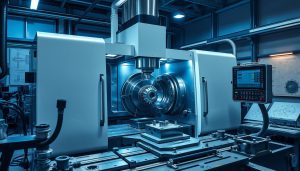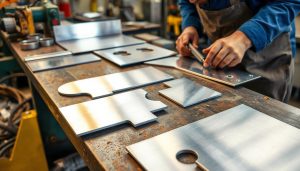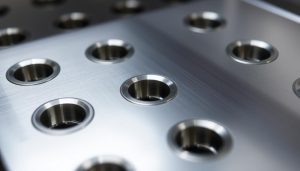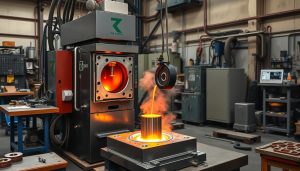In the dynamic world of modern manufacturing, sheet metal fabrication has emerged as a crucial process that enables the creation of intricate, custom-made metal parts and components. This versatile technique, which involves transforming flat sheets of metal into a wide range of shapes and sizes, has become indispensable across diverse industries, from aerospace and automotive to electronics and construction.
The sheet metal fabrication process encompasses a series of specialized techniques, including cutting, bending, and welding, all tailored to transform raw metal into precisely engineered products. Whether you’re in need of a simple metal bracket or a complex industrial component, the sheet metal fabrication process offers a cost-effective and efficient solution that delivers unparalleled precision and versatility.
What is Sheet Metal Fabrication?
Sheet metal fabrication is the process of transforming flat metal sheets into functional and intricate parts, components, and structures. It involves a series of specialized techniques that manipulate and shape the metal to create desired forms and designs. This versatile process is widely employed across various industries, from aerospace and automotive to construction and consumer electronics.
Overview of Sheet Metal Fabrication
At the core of sheet metal fabrication is the ability to precisely cut, bend, and join metal sheets. Skilled craftsmen and advanced machinery work in harmony to transform these raw materials into complex and customized products. The process often begins with the selection of the appropriate metal, such as steel, aluminum, copper, or brass, each with its unique properties and applications.
Common Materials Used in Sheet Metal Fabrication
- Steel – A versatile and durable material, steel is a popular choice for its strength, corrosion resistance, and cost-effectiveness.
- Aluminum – Lightweight yet strong, aluminum is commonly used in applications where weight is a consideration, such as in the aerospace and automotive industries.
- Copper – Known for its excellent electrical and thermal conductivity, copper is often used in electronics and consumer products.
- Brass – A alloy of copper and zinc, brass offers a decorative and corrosion-resistant option for various architectural and decorative applications.
The selection of the appropriate metal is crucial, as each material’s unique properties and characteristics will determine the final product’s performance, durability, and aesthetic appeal.
Key Sheet Metal Fabrication Techniques
When it comes to sheet metal fabrication, a range of cutting, bending, and welding techniques are employed to transform flat metal sheets into intricate, functional components. These techniques showcase the versatility and precision of the sheet metal fabrication process, catering to diverse industries and applications.
Cutting Techniques: Laser Cutting, Punching, and Shearing
One of the most crucial steps in sheet metal fabrication is cutting the material to the desired shape and size. Sheet metal cutting techniques like laser cutting, punching, and shearing offer unique advantages:
- Laser cutting: Delivers clean, intricate cuts with exceptional accuracy and speed, making it ideal for complex designs.
- Punching: Efficiently creates holes, slots, and perforations in sheet metal, often used for fastening and ventilation applications.
- Shearing: Provides a cost-effective way to cut straight edges and simple shapes, making it a popular choice for high-volume production.
Bending and Forming: Processes and Applications
Once the sheet metal is cut, various metal bending processes are utilized to give it the desired three-dimensional form. Techniques like brake pressing, roll forming, and stamping allow for the creation of complex shapes and contours, enabling the fabrication of a wide range of products.
Welding and Joining Methods in Fabrication
The final step in sheet metal fabrication often involves welding methods to join the various components together, ensuring a strong and durable structure. Techniques such as MIG, TIG, and spot welding are commonly employed, each with its own advantages in terms of speed, precision, and the type of materials used.

“The versatility of sheet metal fabrication techniques allows designers and engineers to push the boundaries of what’s possible, creating innovative solutions that meet the ever-evolving needs of various industries.”
Advantages of Sheet Metal Fabrication
Sheet metal fabrication offers a wealth of benefits that make it a preferred choice in various industries. From its cost-effectiveness to the precision and versatility it provides, this manufacturing process has become an invaluable asset for businesses seeking efficient and customized solutions.
Cost-Effectiveness and Efficiency
One of the primary advantages of sheet metal fabrication is its cost-effectiveness. The process is highly efficient, allowing manufacturers to produce high-quality parts and components with minimal waste. This, in turn, translates to lower production costs and greater profitability for businesses. Additionally, the adaptability of sheet metal fabrication techniques enables quick turnaround times, further enhancing the efficiency of the manufacturing process.
Precision and Versatility in Design
Modern sheet metal fabrication techniques, such as laser cutting and CNC machining, offer unparalleled precision in the creation of complex designs. This allows manufacturers to produce parts and components that meet the most stringent specifications, ensuring a perfect fit and finish. Moreover, the versatility of sheet metal fabrication enables customization, allowing businesses to create unique, tailor-made solutions that cater to their specific needs.
Applications Across Various Industries
The benefits of sheet metal fabrication extend across a wide range of industries, from aerospace and automotive to electronics and consumer products. This diverse applicability showcases the adaptability and versatility of the fabrication process, making it an invaluable asset for businesses seeking to stay competitive in their respective markets.
| Industry | Applications of Sheet Metal Fabrication |
|---|---|
| Aerospace | Aircraft components, satellite parts, and various aerospace structures |
| Automotive | Body panels, engine components, and structural supports |
| Electronics | Enclosures, housings, and brackets for electronic devices |
| Construction | Roofing, siding, and architectural elements |
By leveraging the benefits of sheet metal fabrication, businesses can streamline their manufacturing processes, enhance the quality of their products, and stay ahead of the competition in their respective markets.
Industries That Benefit from Sheet Metal Fabrication
Sheet metal fabrication is a vital process that supports a wide range of industries, from aerospace to construction. By leveraging the precision, durability, and cost-effectiveness of custom-made metal parts, these sectors have been able to drive innovation and enhance the quality of their products and services.
Aerospace, Automotive, and Construction Industries
The aerospace industry is a prime example of where sheet metal fabrication shines. Aircraft manufacturers rely on highly specialized sheet metal components to ensure the structural integrity and aerodynamics of their planes. Similarly, the automotive industry utilizes sheet metal fabrication for the production of body panels, chassis components, and various other parts that contribute to the overall strength and design of vehicles.
In the construction industry, sheet metal fabrication plays a crucial role in the creation of buildings, bridges, and other infrastructure. From the development of roofing systems and HVAC ductwork to the fabrication of custom architectural elements, sheet metal is a versatile material that helps bring ambitious construction projects to life.
Electronics and Consumer Products
Sheet metal fabrication is also integral to the electronics and consumer products industries. Manufacturers of electronic devices, such as computers, smartphones, and home appliances, utilize sheet metal components to create durable and aesthetically pleasing enclosures, housings, and other key structural elements. This attention to detail and craftsmanship helps to ensure the longevity and reliability of these everyday products.

“Sheet metal fabrication is the backbone of numerous industries, enabling them to push the boundaries of innovation and deliver high-quality, reliable products to consumers.”
By leveraging the unique properties of sheet metal, these diverse industries are able to create innovative, cost-effective, and visually appealing solutions that meet the ever-changing needs of their customers. From the skies to the road, and from the office to the home, sheet metal fabrication continues to play a vital role in shaping the products and structures that define our modern world.
Why Choose Shixinproto’s Sheet Metal Fabrication Services?
When it comes to professional sheet metal fabrication, Shixinproto stands out as a reliable and experienced partner. Our state-of-the-art facilities and skilled team of experts are dedicated to delivering custom metal fabrication services that exceed your expectations. From precision laser cutting to intricate bending and welding, we possess the capabilities to transform your design ideas into high-quality metal components.
At Shixinproto, we take pride in our commitment to quality manufacturing. Our adherence to industry standards and adherence to strict quality control measures ensures that every metal part we produce meets the highest standards. Whether you’re in the aerospace, automotive, or electronics industry, you can trust Shixinproto to deliver the quality metal manufacturing solutions your business needs.
What sets Shixinproto apart is our ability to cater to diverse client requirements. Our versatile metal fabrication services can handle a wide range of materials, from stainless steel to aluminum, and we have the expertise to tackle even the most complex custom projects. With our advanced equipment and experienced team, we are confident in our ability to bring your vision to life and exceed your expectations.





